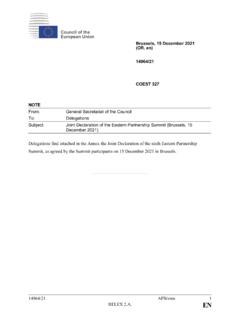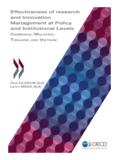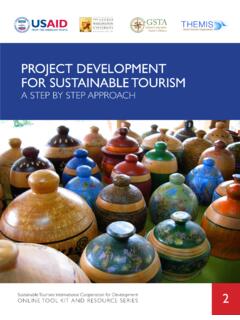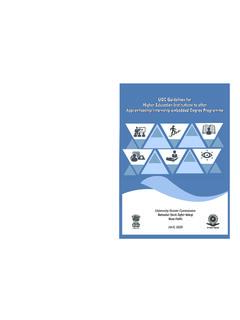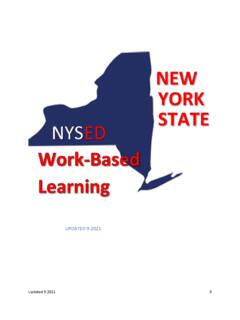Transcription of The Second African Union – European Union Foreign Affairs ...
1 1 | Page The Second African Union European Union Foreign Affairs Ministerial Meeting Kigali, Rwanda, 25 26 October 2021 Joint Communiqu 1. The Ministers of Foreign Affairs of the Member States of the African Union (AU) and the European Union (EU) met on 26 October 2021 under the Co-Chairpersonship of Mr. Christophe Lutundula Apala Pen Apala, Deputy Prime Minister and Minister of Foreign Affairs of the Democratic Republic of Congo (DRC) and Chairperson of the African Union Executive Council, and Mr. Josep Borrell, High Representative of the European Union for Foreign Affairs and Security Policy and Vice-President of the European Commission; 2.
2 Ministers noted with great concern that the COVID-19 pandemic continues to have enormous consequences which pose serious threats to the stability and prosperity of our societies and that vaccines are critical for ending the pandemic. Ministers welcomed the leading role played by the AU in coordinating Africa s response to the pandemic and the substantial efforts of the EU under the Team Europe approach. Ministers agreed to enhance cooperation on equitable access to vaccines, diagnostics and treatments. They welcomed Team Europe s substantial contribution to the COVAX facility, its commitment to increase doses sharing by the end of 2021, and the EU contribution for vaccination rollout campaigns in Africa.
3 They agreed to jointly strengthen further local manufacturing of vaccines and other health products in Africa. Ministers agreed that the COVID-19 pandemic has demonstrated the need for both continents to work closer together in pursuing goals and addressing challenges, and to build back better and greener; 3. Ministers noted that the Covishield vaccine, manufactured by the Serum Institute of India under license from Astra Zeneca/Oxford, and distributed through the COVAX mechanism, meets all the requirements of the World Health Organization (WHO) and was one of the first COVID-19 vaccines to be granted Emergency Use Listing by WHO. Ministers encouraged ongoing efforts to develop COVID-19 vaccination certificates which could allow for their reciprocal recognition; 4.
4 Ministers recalled the Declaration of the 5th AU-EU Summit held in Abidjan, Cote d Ivoire, on 29 30 November 2017, which agreed that for the period leading up to the next Summit the strategic priorities will be: Investing in people education, science, technology and skills development; Strengthening Resilience, Peace, Security and Governance; Migration and Mobility; and Mobilising Investments for African structural sustainable transformation; 5. Ministers welcomed the ongoing dialogue between the AU Commission and its EU counterparts and called for its enhancement ahead of the 6th EU AU Summit with a view to strengthening cooperation ; they welcomed progress made on the implementation of the Abidjan Declaration; 6.
5 Ministers recalled the outcomes of the 1st EU-AU Ministerial meeting in Brussels, in January 2019, and noted the Decision of the Assembly of the AU Heads of State and Government of February 2019, both calling to pursue efforts towards the conclusion at the 6th EU-AU Summit of an enhanced AU-EU continent-to-continent partnership based on the realisation of the United Nations 2030 Agenda for Sustainable Development and respective political agendas. The enhanced partnership should be based on shared values, mutual interests and opportunity for a paradigm shift to an even stronger, mutually beneficial partnership in the spirit of shared ownership, responsibility, reciprocity, respect and mutual accountability and transparency.
6 It should be fit for purpose to achieve common goals as well as tackle current and future challenges in a changed global context; 2 | Page 7. Ministers confirmed that the AU-EU Summits provide the strategic and political steer for the AU-EU continent-to-continent partnership and emphasised the need to ensure consistent implementation in the various cooperation frameworks between the EU and Africa; 8. In the main priority areas of the Abidjan Declaration, Ministers highlighted the following: Investing in people education, science, technology and skills development 9. Ministers acknowledged the key role of skills development and equitable quality education that match labour market needs as well as research and innovation to drive a sustainable socio-economic recovery from the COVID-19 pandemic and to boost societal resilience against future crises.
7 Ministers further called for robust initiatives to minimise the effects of the COVID-19 pandemic on children and students, particularly girls, the vulnerable and hard-to-reach, including by supporting teachers and alternative methods of learning such as distance education and blended learning; 10. Ministers also took note of progress made since the Abidjan Summit in advancing the Pan- African Virtual and E-University and a Pan- African quality assurance and accreditation framework. They commended the conclusions of the 1st AU-EU Research and Innovation Ministerial meeting on COVID-19, and noted the regular holding of the AU-EU High Level Policy Dialogue on Science, Technology and Innovation, and the successful progress made under the AU-EU Research and Innovation Partnerships in supporting agriculture, food security, sustainable energy, climate and health research and innovation in Africa; Ministers welcomed the prospects for launching an EU-AU Innovation Agenda at the next EU-AU Summit; 11.
8 Ministers highlighted the role of youth as drivers for sustainable and inclusive development and emphasised the importance of active participation, social and economic empowerment and adequate and inclusive political participation of youth. Ministers further took note of progress under the AU-EU Youth Track, including the Youth cooperation Hub and its Innovation fund to pilot proposals from young people, and endorsed continued work on establishing the next phase of our AU-EU Youth cooperation , , based on the principles of openness, inclusiveness, dialogue and innovation to deliver tangible results for young people on the ground. They also launched the AU-EU Skills for Youth Employability Programme aimed at enhancing skills and promoting links with the private sector.
9 Ministers underscored the role of human capital development through education, training and skills revolution in support of economic and social prosperity and welcomed the bilateral and multilateral opportunities offered to students and researchers by Member States and EU programmes such as under Erasmus+ and Marie Sk odowska-Curie actions. Eurostat s latest statistics report indicates that about 200,000 African students and researchers are studying in the EU representing an increase of 9% since 2017; 12. Ministers also emphasised the necessity to expand opportunities for Technical and Vocational Education and Training (TVET) and reaffirmed their commitment to support the implementation of the Continental Education Strategy for Africa (CESA) through TVET programmes in sectors with high job creation potential as well as through the programme supporting the harmonisation and modernisation of higher education systems, academic mobility, recognition of qualifications, quality assurance and accreditation.
10 They recommitted to eliminating child labour and forced labour, and trafficking in human beings; 13. Ministers reaffirmed that a people-centred approach is at the core of the AU-EU multi-stakeholder partnership and that research and innovation, education and culture, training and tourism are key sectors for African sustainable development and employment creation, especially for the youth. They further reaffirmed that the AU-EU partnership values the benefits of people-to-people ties, relations with local actors, and ensures the active participation of civil society organisations. The role of diaspora, in Europe and in Africa, is key to promoting dialogue and a deeper inter-cultural mutual understanding .
